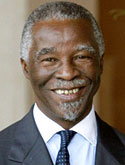 |
The Group of 77 at the United Nations:
The Collected documents of the Group of 77 Edited by Mourad Ahmia, Published by Oxford University Press
|

Thabo Mbeki
Hon. President of South Africa
Hon. President of South Africa
Volume 2 - South-South Cooperation
FOREWORD
FOREWORD
Since the Group of 77 came into existence four decades ago, the South has gained strength by making use of its collective energies and potentialities. The economies of the developing countries are increasingly expanding and South-South solidarity has deepened.
Linked by the history of the struggles for liberation, freedom and democracy, a common geography and shared development challenges, the countries of the South have important lessons to share among themselves and with the rest of humanity. In this regard, the Group of 77 is privileged to playa powerful role in economic and social transformation by offering a vision that represents the collective voice of Africa, Asia and Latin America and the Caribbean.
While it is true that much remains to be done to realise the full potential of South-South cooperation, I do believe that there is an urgent need to disseminate more widely the many success stories of South-South cooperation across the international community. The enduring relevance of South-South cooperation is self-evident in the emphasis placed on it in the outcomes of the recent major international conferences and summits documented in this publication.
Accordingly, this publication, The Group of 77 at the United Nations: Collected Documents on South-South Cooperation, is a unique and valuable source of information for policy-makers, researchers and the public at large. As a compilation of major agreements and achievements, it will prove to be crucial in spreading public awareness and greater understanding of the importance of South-South Cooperation. Indeed, it is commendable to document comprehensively the numerous advances brought about by South-South cooperation since the establishment of the Group of 77 in 1964.
Today, the need for South-South cooperation is greater than at any other time and it remains an integral part of the collective strategy of the Group of 77 in support of the economic, social and cultural development of the South.
Efforts are needed to create a global South constituency for international cooperation and development embracing the private sector, civil society, academia, and other sectors of society. Together, we must develop and utilise the full potential of developing countries, taking advantage of the complementarities that exist among us, and strengthening our indigenous management capacities and our economic and social development.
The need for the South to rely on its own resources and potentialities for development and economic growth has been emphasised by the Group of 77 since its founding 40 years ago.
Linked by the history of the struggles for liberation, freedom and democracy, a common geography and shared development challenges, the countries of the South have important lessons to share among themselves and with the rest of humanity. In this regard, the Group of 77 is privileged to playa powerful role in economic and social transformation by offering a vision that represents the collective voice of Africa, Asia and Latin America and the Caribbean.
While it is true that much remains to be done to realise the full potential of South-South cooperation, I do believe that there is an urgent need to disseminate more widely the many success stories of South-South cooperation across the international community. The enduring relevance of South-South cooperation is self-evident in the emphasis placed on it in the outcomes of the recent major international conferences and summits documented in this publication.
Accordingly, this publication, The Group of 77 at the United Nations: Collected Documents on South-South Cooperation, is a unique and valuable source of information for policy-makers, researchers and the public at large. As a compilation of major agreements and achievements, it will prove to be crucial in spreading public awareness and greater understanding of the importance of South-South Cooperation. Indeed, it is commendable to document comprehensively the numerous advances brought about by South-South cooperation since the establishment of the Group of 77 in 1964.
Today, the need for South-South cooperation is greater than at any other time and it remains an integral part of the collective strategy of the Group of 77 in support of the economic, social and cultural development of the South.
Efforts are needed to create a global South constituency for international cooperation and development embracing the private sector, civil society, academia, and other sectors of society. Together, we must develop and utilise the full potential of developing countries, taking advantage of the complementarities that exist among us, and strengthening our indigenous management capacities and our economic and social development.
The need for the South to rely on its own resources and potentialities for development and economic growth has been emphasised by the Group of 77 since its founding 40 years ago.
PREFACE
The present reference work is the second volume in the series “The Group of 77 at the United Nations”. The material compiled in this volume brings together an edition of intergovernmental documents that survey the rationale for South-South cooperation, its scope, modalities, strategic role and support mechanisms with the means of implementation as articulated in various outcome documents issued by the Group of 77 since its establishment in 1964.
This volume, which is intended to bring the Group’s activities to a wider audience, is divided into the following chapters:
In compiling this documentary record, I am most indebted to the staff members of the Office of the Chairman of the Group of 77 in New York for their invaluable contribution and continued support in the publication of the series.
Finally, the views expressed in this Series do not necessarily reflect the views of the United Nations.
This volume, which is intended to bring the Group’s activities to a wider audience, is divided into the following chapters:
- Chapter I provides an overview of the major documents related to the genesis of the Group of 77.
- Chapter II contains the final agreements and outcomes of major meetings of the Group of 77 on Economic Cooperation among Developing Countries (ECDC).
- Chapter III presents the final documents of the sessions of the Intergovernmental Follow up and Coordination Committee on Economic Cooperation among Developing Countries (IFCC) held within the framework of the Caracas Programme of Action on Economic Cooperation among Developing Countries.
- Chapter IV consists of final reports of the G-77 Sectoral Review Meetings in various fields of cooperation.
- Chapters V and VI focus on two major mechanisms of South-South cooperation, namely the Global System of Trade Preferences among Developing Countries (GSTP) and the Perez-Guerrero Trust Fund on Economic and Technical Cooperation among Developing Countries (PGTF).
- Chapter VII draws excerpts on South-South cooperation from the outcome documents of the G-77 South Summits, Ministerial Meetings, and Chapters’ Meetings.
- Finally, Chapter VIII lists the draft resolutions and decisions submitted by the Group of 77 in the General Assembly of the United Nations.
In compiling this documentary record, I am most indebted to the staff members of the Office of the Chairman of the Group of 77 in New York for their invaluable contribution and continued support in the publication of the series.
Finally, the views expressed in this Series do not necessarily reflect the views of the United Nations.
Available at the following Major Libraries
ISBN: 978-0-19-536665-5
This volume will soon be available in French and Spanish.
Available for purchase at the following Major Bookstores
ISBN: 978-0-19-536665-5
This volume will soon be available in French and Spanish.
Book Launching Ceremonies for the series held in 2008/2009
- Abidjan (Côte d'Ivoire)
- Beijing (China)
- Dubai (United Arab Emirates)
- Muscat (Oman)
- New York (USA)
- Rome (Italy)
- Saint John's (Antigua & Barbuda)
- Santo Domingo (Dominican Republic)
